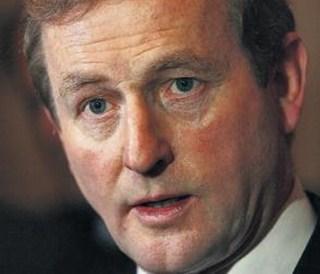Power of party leaders will determine campaign

Micheál Martin has scored the first goal in the election campaign – by exposing Fine Gael's nervousness over Enda, writes Vincent Browne.
The issue of leadership is, for now, important for several reasons. It matters to the financial markets and to negotiations with the IMF and EU on the terms of the rescue package. It also matters to national self-confidence right now and it matters to international confidence in Ireland's capacity to govern itself. If the new Taoiseach is so distrusted by his own party to negotiate his way through an election campaign, what hope is there?
The stuff about an election campaign not being a 'beauty contest' is just diversionary palaver. If the new Taoiseach is not capable of convincingly explaining his government's policies the new government will be impaired from the outset.
So it does matter how Enda Kenny fares in election debates and in challenging interviews. The more of those there are, the more opportunity the electorate will have to assess his suitability for the office to which he aspires.
Debates between the three people offering themselves as prospective Taoiseach are also important. They are applying to the electorate for a job, and the electorate is entitled to see how they compare with one another, as well as how they fare in challenging interviews on their own.
Yes of course there is also scope for debates involving the leaders of all the parties but, if a candidate for the position of Taoiseach refuses to permit the electorate to assess his (not her) performance against his challengers for that position, that refusal speaks a lot.
Yes, I have a personal interest in such debates and interviews taking place for I may have an involvement in some of them but I think the case for debates and challenging interviews stands on its own.
It is not just End Kenny who has questions to answer. Micheál Martin is carrying a lot of baggage into this election. He was at the cabinet table from July 1997 until a few weeks ago and he participated in all those decisions (and non-decisions) that have ravaged this country.
A formulaic apology doesn't relieve him of that baggage, all the more so since he was one of the cheerleaders for the light tough regulatory regime that did such damage.
A vote for Micheál Martin's Fianna Fail can be seen as an endorsement of the recklessness of the Bertie era.
It is also specifically an endorsement of the EU/IMF deal and of the EU/IMF-imposed four-year plan and Martin has specifically acknowledged that.
It is no free ride for Eamon Gilmore either. For starters, a vote for Labour is a vote for Enda Kenny as Taoiseach. That is the reality, and all the guff about Labour getting more seats than Fine Gael is just avoidance.
That reality is copperfastened by Eamon Gilmore, who has specifically ruled out any other governmental option in advance of the election outcome, an option which might have resulted in Labour policies being implemented, rather than emasculated as will happen in coalition with Fine Gael.
It has also weakened Labour's hand in post-election negotiations with Fine Gael, which means that a vote for Labour is not just a vote for Enda Kenny as Taoiseach but a vote for Fine Gael's policies.
Sinn Féin has problems of their own. Gerry Adams is probably the ablest politician on the island of Ireland. Certainly, it is hard to envisage that any other leader of the republican movement could have led a united republican movement away from violence and towards an acceptance of the partition of the country. And it is greatly to his credit, however much there is to his discredit.
But Gerry Adams knows little about southern politics and damn all about southern economics and however well he is briefed he is thoroughly unsure and unconvincing.
The most able politician to enter the Dáil in many years has been Pearse Doherty of Sinn Féin. He carries no baggage, (that we know about) from the era of IRA atrocities, he is articulate, presentable and assured. Were he the lead Sinn Féin spokesperson the party might do spectacularly well in this election. But he is not.
As I see it, the election is about the kind of society we want here. Do we want a radical change in the structure of society whereby wealth, income, power, influence and welfare are redistributed and the people are given a direct say in major decisions but with lower growth and, for a while at least, less job creation?
Or do we want a less radical change with incremental improvement in equality with some job creation?
Or do we want a society that is more or less as it is but better managed politically?
Or a society that is even more unequal, but perhaps with the prospect of greater growth and maybe more jobs sooner rather than later?
But somehow I think such an agenda will get derailed fairly quickly.
